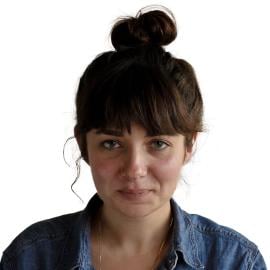The UN says people fleeing so-called Islamic State are being prevented from seeing medical workers until they undergo security screening at a displacement camp in Syria, despite travelling long distances in the winter cold and after enduring months of food shortages.
As of last week, the UN’s World Health Organisation said 35 children and newborns had died in the last two months either en route or shortly after arrival to al-Hol, the main camp where people leaving IS territory are taken.
A spokesman for the Syrian Democratic Forces, the US-backed Kurdish-led alliance of militias fighting off the last vestiges of IS in Hajin and surrounding areas of Syria’s eastern Deir Ezzor province, insisted they are putting the health needs of new arrivals first.
A total of 25,000 people have fled to al-Hol camp in Hassakeh province since the beginning of December, 10,000 of them since 22 January.
The SDF controls the territory around al-Hol camp and screens people leaving IS territory to separate off those suspected of being IS members and fighters from civilians. This is done at multiple locations in Syria, including at al-Hol.
"I personally made sure that medical teams are receiving newcomers before any specific screening or measures."
With priority given to the screening process, new arrivals are being made to wait “too long in the reception area at the camp before medical triage takes place,” Elizabeth Hoff, the WHO’s representative in Syria, told IRIN. “When they come to the camp, we want to see them immediately,” she said. “If there are sick children or critically ill patients, we don’t want to wait until they are finished [the screening].”
Hoff said most of the 35 deaths were from hypothermia or hypoglycemia; cold and hunger. IRIN was with the SDF when it met a convoy of people fleeing IS in January, and many said they had been living with severe shortages of food and medicine for months.
Mustafa Bali, spokesman for the SDF, denied Hoff’s assertion that security was being prioritised over health.
He told IRIN that “no security screening is being conducted before the provision of medical and logistical services,” adding that medical care was provided by the SDF’s specialist medical teams in what he called a “humanitarian corridor” between the IS-controlled areas and displaced persons’ camps.
“It is untrue that we subject new arrivals to security screening before medical check-up,” he said. “I visited the humanitarian corridor more than once and I personally made sure that medical teams are receiving newcomers before any specific screening or measures. In addition to the availability of medical teams, food stuffs, water, and essentials are being distributed.”
UN call for earlier help
This is not the first time screening procedures for members of IS have come under scrutiny. As IS has been beaten back in Syria and Iraq, rights groups have expressed concern about separation of families, arbitrary detention, and a lack of transparency in the process.
In a 1 February statement, the UN’s agency for refugees, UNHCR, said it was “concerned about the persistent practice of confiscation of identity documents and movement restrictions imposed on residents of internally displaced people (IDPs) and refugee camps in Hassakeh governorate.”
Hoff also said that WHO, along with other UN agencies, had asked to set up a waystation between Hajin and al-Hol where they could treat emergency medical cases and provide other aid. The journey to the camp is approximately 250 kilometres from Hajin, and she said health workers “need to interact earlier – we cannot wait until they come to the camp”.
“We have asked the forces in control [of the area] for access at the al-Omar oilfield centre [on the route from Hajin to al-Hol] so we can meet them and have a health point to perform medical check-ups there, and also have some ambulances to pick them up and send trauma and critically ill patients to hospitals for treatment,” Hoff said. “Because people are dying… If we interact earlier, we can send ambulances, get people to the hospital earlier.”
Hoff said the request was made over two weeks ago.
Bali denied the SDF had received any such request, saying: “Claims that the UN has requested the establishment of a station near al-Omar oil field are false and we received no request from any side to set [up] such a station.”
“People are dying… If we interact earlier, we can send ambulances, get people to the hospital earlier.”
A spokesman for the US-backed coalition referred questions back to the SDF because, he said, those “forces provided support to the civilians on the ground, not the coalition.”
UNHCR failed to respond to questions about its part in the request to set up a waystation on the way to al-Hol. But in its 1 February statement the agency said that “humanitarian actors have collectively requested forces in control of the area to designate a transit site en route for al-Hol where life-saving assistance can be provided.
“This initiative remains unimplemented more than two weeks later,” the statement added, noting that “little or no assistance is provided en route to the hungry and cold people, the vast majority of whom are women and children.”
(TOP PHOTO: Muhammad, 15, fled al-Sousah village in Hajin as violence escalated and sought safety at al-Hol camp along with his older brother. CREDIT: Delil Soleiman/UNICEF)
as/ag





